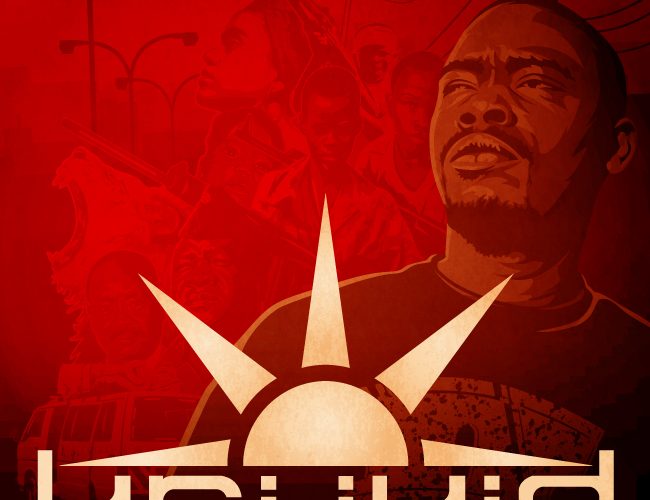Skin and bones, tribal conflicts on dusty plains, dictators who re-elect themselves until their big sleep: the dark continent has stereotypes aplenty to avert your eyes from. On the self-titled first song of his sophomore album, Krukid from Champagne, Illinois, has a different story to tell about the impoverished soil he grew up on. He starts off by giving the A-word illiterates some geographical lessons over a demanding crescendo of truck horns, courtesy of Uncle Sam:
“I’m assailant, victim, pagan, Christian
Labeled a heathen because I follow tradition
Egyptian, Eritrian, I’m Djoubitian
Cape Verdian, Chadian, Cameroonian
I’m Burundian, Ruandese, Togolose
Rep for mine, no matter who I do it on the beats”
His desire to pursue a musical career drove Edwin “Krukid” Ruyonga away from his birth country Uganda towards the northern hemispherical streets of Champagne. After mayflowering himself past US borders, he started spreading the name by swamping mixtapes and MC battle arenas with his mic presence. The local Illinois label Cash Hill Records gave him a chance to record his debut “Raisin in the Sun.” Some talent shows later, Rawkus dragged him aboard to be acrew member in their ‘The Rawkus 50’ comeback campaign. Now his career is underway, Krukid wants to show he hasn’t forgotten about his origins. To prove that urban life is ubiquitous, he paints a portrait of his former “City Life” in Kampala, Uganda with lifelike colors:
“Local politicians with some teeth probably missing
Spend money to make high school girls their other women
Bus parks where matatus (shared taxi) don’t leave the spot
There’s a six people to a three-seated spot
And the potholes and bumps are quick to leave you carsick
The pubs fill with activity as soon as dark hits
And if you know the right spots at which to chill
Just a dollar can get you the whole day free meals
Hit up the booze spots where every one’s a bull shark
And girls coo smart, they breaking these fools hearts
And men talk about the affairs of the state
While women gossip about the state of their affairs”
Listening to Krukid reminiscing siting on an empty beer crate with a pen and pad dissolves glaring generalities. His humming baritone contains no trace of the heavy accent his countrymen get behind-the-back snivels for. The persistence in his voice and his fast-paced way of rhyming makes him sound like a revved up version of Mobb Deep’s Prodigy. Krukid is just as dedicated about telling the story of his upbringing as the ‘Mac’ is about making his comeback. After “Hold On,” a slow love track with lines like “Like good music/yeah/flesh to flesh/handclaps on your ass/say my name, yes, yes” the affectionate imagery of home sweet home gets squashed by one of Uganda’s most repulsive secrets on “Invisible”:
“They call us the invisible children, little civilians
And they abducted when the bullets riddled our buildings
We sitting in millions, we huddle in thousands
With little foreign aid and no government housing
From northern Uganda to southern Sudan
They made me murder as a young and I got blood on my hands
When they killed my father and they raped my mother
And the first life they forced me to take was my brother”
His vocal rage floods the acoustic guitar, even overtaking the sharp metallic drums. Emotion drowns out the pinpointed images which made “City Life” such a clear pattern on the map. “On And On” is another moving tale about kids working every day to help support their unfortunate families. Nine year old Sofie has candy to sell all day because her father contracted cataract. Twelve year old Brian is on the run from rebels who murdered his parents.
Western eyes start averting. Krukid is clever enough to see the iris movement and included a couple of more traditional street tracks without dumbing things down. The ‘cash rules everything around me’ hook on “Green” has been done before, but the track’s folk guitars, Civil War whistles, and buzzing bassline are both a surprising excursion into the Irish musical realm and an enjoyable listen. “My Music, My Country,” with its Kubrick-type horns, could have been the album’s summarizer, as it contains both the positive and negative of the continent Krukid says he “is so proud to be an ambassador of”:
“Stray dogs, goats, and chickens that roam freely
And sunflower oil that’s leaving the bones greasy
From old school Fiats driving in front of Kias
Where loafers are selling second- and third-hand Levis
Bootleg heaven gets spread over street jargon
For every boutique shop is like a hundred flea markets
Street targets unaware of the bull’s eye on their pockets
Figured too late, why is there space now in their wallets?
Every new face in airports is swarmed on by taxi drivers
Fees depending on skin color when there’s cash required
Where kids model wire cars and ride ’em through the slums
And college chicks have lifestyles that require you to front”
The production on this album is a surprising blend of jazz, rock, and classical music with a heavy predilection for high hat snare drums. The more experienced underground producer John Doe (of 1200 Hobos crew) is responsible for most of the album’s highlights, notably the symphony keys over distorted bass on “Live” and the proud horn blasts on “My Music, My Country.” But Falynx’s violin-fueled “City Life” and the earlier mentioned J-Dub produced “Green” account for an uplifting listen.
Storytellers have an eye for detail and the authority in their voice to keep the audience in their chairs. Krukid possesses both qualities, but because his indignation about inequalities sometimes get the better of him, he forgets that to listeners the gruesome tales are a far-away version of their own worries. When the grim reality of his birth grounds doesn’t overshadow his soul, this is the strong second effort of a promising MC who sells his music in an Amer-i-can, but is still proud to be an “Afr-i-can.”

